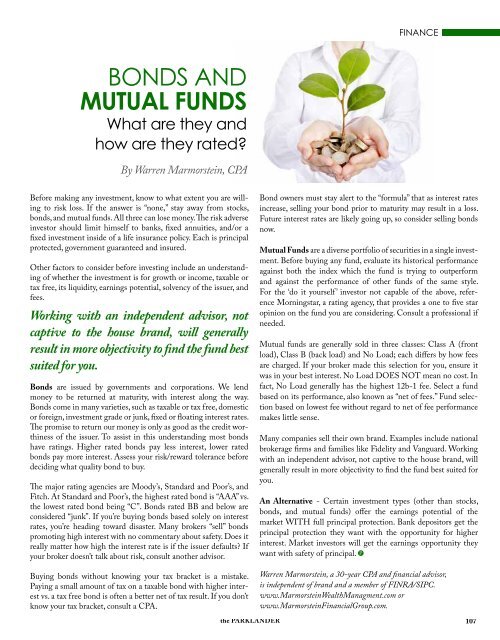Create successful ePaper yourself
Turn your PDF publications into a flip-book with our unique Google optimized e-Paper software.
FINANCE<br />
BONDS AND<br />
MUTUAL FUNDS<br />
What are they and<br />
how are they rated?<br />
By Warren Marmorstein, CPA<br />
Before making any investment, know to what extent you are willing<br />
to risk loss. If the answer is “none,” stay away from stocks,<br />
bonds, and mutual funds. All three can lose money. The risk adverse<br />
investor should limit himself to banks, fixed annuities, and/or a<br />
fixed investment inside of a life insurance policy. Each is principal<br />
protected, government guaranteed and insured.<br />
Other factors to consider before investing include an understanding<br />
of whether the investment is for growth or income, taxable or<br />
tax free, its liquidity, earnings potential, solvency of the issuer, and<br />
fees.<br />
Working with an independent advisor, not<br />
captive to the house brand, will generally<br />
result in more objectivity to find the fund best<br />
suited for you.<br />
Bonds are issued by governments and corporations. We lend<br />
money to be returned at maturity, with interest along the way.<br />
Bonds come in many varieties, such as taxable or tax free, domestic<br />
or foreign, investment grade or junk, fixed or floating interest rates.<br />
The promise to return our money is only as good as the credit worthiness<br />
of the issuer. To assist in this understanding most bonds<br />
have ratings. Higher rated bonds pay less interest, lower rated<br />
bonds pay more interest. Assess your risk/reward tolerance before<br />
deciding what quality bond to buy.<br />
The major rating agencies are Moody’s, Standard and Poor’s, and<br />
Fitch. At Standard and Poor’s, the highest rated bond is “AAA” vs.<br />
the lowest rated bond being “C”. Bonds rated BB and below are<br />
considered “junk”. If you’re buying bonds based solely on interest<br />
rates, you’re heading toward disaster. Many brokers “sell” bonds<br />
promoting high interest with no commentary about safety. Does it<br />
really matter how high the interest rate is if the issuer defaults? If<br />
your broker doesn’t talk about risk, consult another advisor.<br />
Buying bonds without knowing your tax bracket is a mistake.<br />
Paying a small amount of tax on a taxable bond with higher interest<br />
vs. a tax free bond is often a better net of tax result. If you don’t<br />
know your tax bracket, consult a CPA.<br />
Bond owners must stay alert to the “formula” that as interest rates<br />
increase, selling your bond prior to maturity may result in a loss.<br />
Future interest rates are likely going up, so consider selling bonds<br />
now.<br />
Mutual Funds are a diverse portfolio of securities in a single investment.<br />
Before buying any fund, evaluate its historical performance<br />
against both the index which the fund is trying to outperform<br />
and against the performance of other funds of the same style.<br />
For the ‘do it yourself ’ investor not capable of the above, reference<br />
Morningstar, a rating agency, that provides a one to five star<br />
opinion on the fund you are considering. Consult a professional if<br />
needed.<br />
Mutual funds are generally sold in three classes: Class A (front<br />
load), Class B (back load) and No Load; each differs by how fees<br />
are charged. If your broker made this selection for you, ensure it<br />
was in your best interest. No Load DOES NOT mean no cost. In<br />
fact, No Load generally has the highest 12b-1 fee. Select a fund<br />
based on its performance, also known as “net of fees.” Fund selection<br />
based on lowest fee without regard to net of fee performance<br />
makes little sense.<br />
Many companies sell their own brand. Examples include national<br />
brokerage firms and families like Fidelity and Vanguard. Working<br />
with an independent advisor, not captive to the house brand, will<br />
generally result in more objectivity to find the fund best suited for<br />
you.<br />
An Alternative - Certain investment types (other than stocks,<br />
bonds, and mutual funds) offer the earnings potential of the<br />
market WITH full principal protection. Bank depositors get the<br />
principal protection they want with the opportunity for higher<br />
interest. Market investors will get the earnings opportunity they<br />
want with safety of principal. P<br />
Warren Marmorstein, a 30-year CPA and financial advisor,<br />
is independent of brand and a member of FINRA/SIPC.<br />
www.MarmorsteinWealthManagment.com or<br />
www.MarmorsteinFinancialGroup.com.<br />
the PARKLANDER 107


















